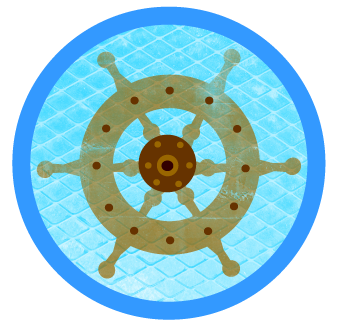Mozilla's Open Badges Project
 I sat in on a webinar today about how Mozilla and others are using badges as a way of recognizing and legitimizing learning and skill development that happens outside of the classroom. (I assume the webinar will be archived at connectedlearning.tv/webinar-archive.)
I sat in on a webinar today about how Mozilla and others are using badges as a way of recognizing and legitimizing learning and skill development that happens outside of the classroom. (I assume the webinar will be archived at connectedlearning.tv/webinar-archive.)The concept of issuing badges is usually compared to the scouting merit and skill badges that have been around for a long time, and the badges that come for game achievements.
The main presenter was Erin Knight - Senior Learning Director at Mozilla - who currently spearheads the learning and badge work, overseeing the building of learning pathways for webmaker skills, as well as the development of the Open Badge Infrastructure.
The Mozilla Open Badge infrastructure enables any organization or community to issue badges backed by their own seal of approval. Learners/users can then collect badges from different sources and share them across the web, unlocking new career and learning opportunities.
Here is some of what I culled from the session and the Mozilla site:
There are countless examples of learning occurring through informal channels. The web and other new learning spaces provide exciting new ways to gain skills and experiences—from online courses, learning networks and mentorship to peer learning, volunteering and after-school programs.
While degrees do convey information about people’s skills, they often tend to be abstracted from the actual learning that has occurred. Two people with the same degree may have taken very different learning pathways or developed different skills. Many people without a formal degree possess a vast set of job-relevant skills. Badges help by providing a more complete picture, recognizing a more granular set of skills.
I good real world example of that is resumes. Resumes are documents that people write themselves and granular information on a resume is often difficult to validate. With digital badges, users can click on a given badge to access information about the badge’s issuer, how the badge was earned, and more. In other words, badges can go beyond traditional resumes by providing built-in evidence for validation.
The Mozilla Open Badge site OpenBadges.org (still beta) can get you started on using, creating and issuing badges.
Mozilla started with this project in 2010 and is now at the point of a public beta. On the Mozilla blog they discussed the Open Badges Infrastructure entering public beta which allows badge issuers and developers to have access to the software that will allow them to build badges.
Though I am viewing all this through my academic lenses (and with the idea that school credit will be changing radically in the near future), most of these badge efforts are from online or out-of-school learning situations. For example, the past year they have been used by NASA, Disney-Pixar and 4H.
The public-beta adds new features like an improved badge issuer API and new ways for users to manage their badges.
Mozilla has a "Badge Backpack” so that users can store, manage, import and group badges earned from multiple sites in a single location. A new displayer API will make it easier to display digital badges across the web, from personal web sites to social networking platforms. There are also documentation and privacy features, including an updated privacy policy, terms of use and FAQs for developers. The hope is that they can get from beta to version 1.0 by the end of the year.
If you want to start working with Open Badges right now, check out the developer documentation and source code.
The Mozilla project it totally new to me, but I did learn the basics about Open Badges (and earn my first 2 badges) today.
The webinar was via Connected Learning's Livestream channel. They offer a lot of education webinars using Livestream, Google+ Hangouts etc. Their Twitter hashtag is #connectedlearning.